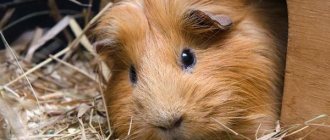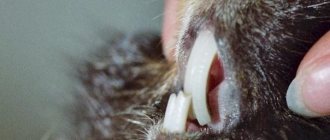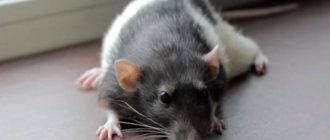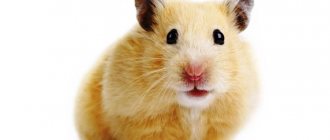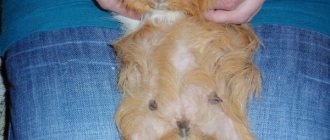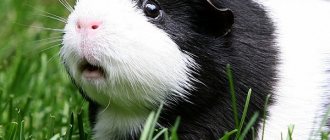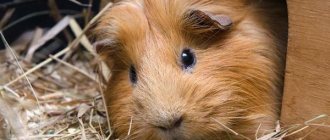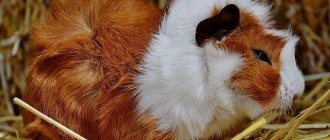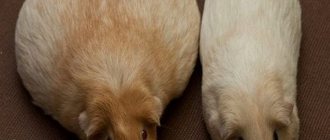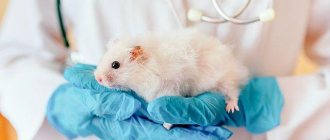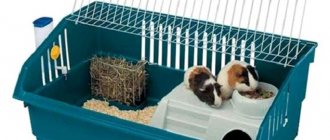Endoparasites, which include, in particular, worms, are not so easy to detect and eliminate in guinea pigs.
Worms lead a parasitic life in the body of an animal. Undoubtedly, their presence is harmful to animals, since worms absorb nutrients and can cause depletion of the body. All worms, in the course of their life activity, release toxic substances, which causes intoxication of the animal's body.
What to do in such a situation? To get started, we recommend reading this article. This article describes in detail methods of controlling parasites. We also recommend that you consult a specialist. Read the article >>>
How to understand that an animal has worms
The first symptoms of worms in guinea pigs are behavior unusual for healthy animals. The pig begins to itch, behaves restlessly, and loses its appetite. These signs may also indicate a tick infestation.
Why are helminths dangerous?
Parasites that live in the animal’s body cause allergies and provoke inflammation of the intestinal walls. This causes the pig to lose weight, feel weak, eat poorly - all this leads to anemia. A young rodent infected with helminths may die due to intestinal overflow and subsequent rupture of its walls.
Types of endoparasites in rodents
Guinea pigs become infected with two types of worms that parasitize their internal organs:
- liver fluke;
- worms.
They are dangerous not only because they suck nutrients from the animal’s body, but also because they release toxic substances as a result of their vital activity.
Diseases dangerous to humans
Parasites that cause dangerous diseases for humans and live in the body of a guinea pig include:
- Strongyloidiasis,
- Giardiasis,
- Encephalitis.
Strongyloidiasis
The disease is caused by small roundworms that parasitize the small intestine. A person can become infected with worm larvae while cleaning a cage or processing an infected animal. The first and most important symptoms of the disease are nausea, severe abdominal pain, diarrhea, headache and dizziness. If you do not consult a doctor in a timely manner, anemia may develop. Cases of death have been recorded. Guinea pigs can carry larvae without showing symptoms of infection. This happens when the animal has the opportunity to walk in the summer and comes into contact with grass and soil outside.
Giardiasis
A person can become infected with giardiasis during cage cleaning, as well as through contact with an infected animal. The disease is caused by a small parasite that lives in the small intestine and gall bladder.
Symptoms of infection:
- Nausea,
- Stomach ache,
- Bloating, gas formation, constipation and diarrhea, replacing each other,
- Skin rashes
- Fatigue, increased drowsiness, loss of appetite, poor sleep and frequent dizziness.
Liver fluke - routes of infection and stages of treatment
A guinea pig can catch this type of parasite by drinking dirty water or eating low-quality food. At the initial stage, the pet becomes lethargic, eats poorly, and vomits. The pig's temperature gradually rises. When the initial stage ends, all symptoms may disappear, but the fluke has already settled in the animal’s liver and is destroying it. Treatment is usually long-term.
A liver fluke infection can only be accurately diagnosed by examining the animal at a veterinary clinic. If treatment is not started in a timely manner, he will die. Depending on what the tests show, the veterinarian will prescribe medications.
At the first stage, symptoms disturbing the mumps are relieved and the following are prescribed:
- anti-inflammatory drugs;
- antibiotics;
- hepatoprotectors;
- vitamins.
The second stage of treatment consists of anthelmintic therapy. Usually the animal is prescribed the anthelmintic drug Praziquantel.
Treatment ends with rehabilitation procedures. This is a diet and taking medications that restore damaged cells and tissues of internal organs.
Types of worms
There are two types of worms in pigs: flat (tape) and round. There are many types of flatworms. They usually look like a long strip consisting of several sections. At the end of the body there is a small head with suction cups, with the help of which the parasite attaches to the organs.
Once in the body, the flatworm lays eggs in the animal’s intestines and leaves the body through the anus. The embryos pierce the intestinal walls and enter the lymphatic vessels. In this way, the parasites penetrate the muscles and organs.
Roundworms are thinner than tapeworms and are white or pink in color. They live mainly in the digestive tract, less often in the liver or lungs. The eggs that the worm lays are excreted from the body along with the feces.
Trixacarosis
The causative agent of the disease is the microscopic scabies mite Trixacarus caviae, which parasitizes the subcutaneous layer. It differs in that it affects only guinea pigs, so infection occurs exclusively through sick relatives.
This disease is especially difficult for young and elderly individuals, animals exhausted by other diseases, pregnant females and pigs that are kept in inappropriate conditions. Suspicion of trixcarosis arises from the following signs:
- severe itching and soreness of the affected areas of the skin;
- the animal scratches the skin with its claws and teeth;
- hair loss and the appearance of significant areas of baldness;
- open ulcers and wounds on the skin;
- lethargy of the animal, refusal of food and drink;
- cramps.
If the disease is advanced, the female may have a miscarriage. If animals are not treated at all, they die.
Trixacarosis is diagnosed by skin scraping in a veterinary clinic, and the animal is treated there.
As treatment, injections are prescribed with one of the antiparasitic drugs: otodectin, ivermectin, ivermec or novomec.
What symptoms indicate the presence of fleas
Signs that an animal is being bitten by fleas are as follows:
- redness and peeling of the skin, bite marks (usually on the stomach) in the form of red dots;
- the pig behaves restlessly, shakes its head, itches, eats poorly, becomes less active;
- In places where insects accumulate, hair loss may occur.
Insects pierce the skin and drink blood. The bites are painful, and there are no anesthetics in the saliva. In the affected areas, the skin becomes inflamed, itches, and hurts when scratched.
Flea bites cause red spots on your pig's skin.
Prevention
If in addition to the guinea pig, there are other pets in the house - cats or dogs, they must be regularly treated with insecticides so that they do not catch the infection and “reward” the little pet with it. This rule especially applies to those pets who are allowed to go outside for a walk.
The usual requirements for the conditions of keeping a pig play the role of preventive measures. These include:
- cleaning the animal's house;
- changing filler and bedding;
- treating the pet's cage and items with disinfectants.
All this should be done regularly and on an ongoing basis, and not just during or after an illness. Before going on walks, your pig needs to be protected against parasites.
It is very important to seek medical help at the first symptoms of infection. The consequences of an advanced disease are irreversible for the animal’s body, which leads to its death. The sooner treatment is started, the greater the chances of ridding your pet of the disease and returning him to his normal life and normal well-being.
It is not worth treating the animal on your own - only a veterinarian can prescribe the correct treatment. Self-selected therapy can cost the animal its life. Control by a veterinarian and a responsible approach to healing your pet are the key conditions that will soon allow you to see your pet healthy and active.
Treatment
Worms are removed from guinea pigs, usually with medications for cats and dogs. Since a wide range of medications specifically for rodents are not produced. It is better when a veterinarian prescribes medications and determines their dosage.
Known treatments:
- suspension for deworming rodents “Shustrik”,
- "Dirofen paste" for puppies,
- suspension "Prasicide" for kittens.
They should be used strictly according to the instructions; the dosage can be calculated based on the pet’s body weight. For treatment use any one remedy. These drugs are not used for prevention.
Worms in guinea pigs require immediate treatment! And in the case of using modern drugs, treatment will give a fairly quick positive effect.
To reduce the risk of infecting the animal with worms, the pig’s cage and objects for use should be cleaned on time, especially the toilet. Feed with professional food, give fruits and vegetables only washed, and drink filtered water. If the guinea pig is completely domestic and does not come into contact with the street or other domestic animals, but has become infected with worms, then the source is in the apartment. In this case, you need to do a general cleaning - parasite eggs could be brought into the apartment with any outdoor item.
Did you like the article? Share with friends: [supsystic-social-sharing id=”1"]
- Related Posts
- Guinea pigs
- What not to feed a guinea pig
- How to tame a guinea pig
« Previous entry
Treatment of worms in guinea pigs
Worms parasitize in the animal's intestines, absorbing nutrients. Infection with them can lead to depletion of the animal’s body. Their waste products cause intoxication.
There are two types of worms:
- flat (tape);
- round.
- Flat (ribbon) - parasitic in the intestines. In appearance, such a helminth resembles a narrow braid, which consists of individual members. The body tapers towards one end - there is a head with suction cups. The closer the worm's body segment is to the tail, the more mature it is. Once the eggs in it have finished maturing, it opens and the parasite eggs end up in the external environment along with the feces of the infected animal. If food or water contaminated with helminth eggs enters the body of a healthy animal, parasite embryos will hatch in its intestines. They are embedded in the tissues of the intestinal walls, and from there they enter the bloodstream and spread throughout the body.
Consequences: cysts with embryos may form in the internal organs and brain of the animal, which are detrimental to health.
- Round - there are several types. Most often, the one with the body in the form of a thin thread of white or pinkish color settles in the body of animals. This species parasitizes mainly in the intestines, less often it affects the lungs and liver. When infected animals defecate into the environment, mature parasite eggs are released. Healthy animals become infected through food and water.
By contacting pets infected with worms, the entire household can become infected. Therefore, having discovered symptoms of parasite damage in an animal, it is necessary to urgently seek the services of a veterinarian. Worms in guinea pigs can be easily removed with the antihelminthic drug Piperazine.
Endoparasites
Endoparasites are parasites that live in the internal organs of a guinea pig. They cause great harm to health and cause not only various poisonings, but also lead to disruption of the functioning of internal organs, as well as the death of the animal. Most often, a guinea pig suffers from:
- worms,
- liver flukes.
Worms
These parasites not only absorb nutrients, but also lead to intoxication and depletion of the body. Typically, guinea pigs are susceptible to infection with two types of worms:
- tape or flat,
- round.
Adult flatworms are parasitic in the intestines and have a ribbon-shaped body. The embryos of worms, having entered the animal’s body along with low-quality food, can drill through the wall of the small intestine and enter the blood. They are able to move freely throughout the body through the circulatory system and settle in the lungs, liver, and brain, which will lead to the rapid death of the animal. Worm larvae are dangerous not only for guinea pigs, but also for humans. An infected animal can be easily identified by lethargy and drowsiness, weight loss, increased appetite and thirst. If the infection is severe, then in the animal’s feces you can see not only worm larvae, but also adult individuals. And with a very severe infection, worms can crawl out of the anus.
Roundworms vary in appearance and can be shaped like a thin thread or a grain of rice. Some are whitish in color and some are pink. Parasites most often live in the intestines, lungs and liver. They lead to exhaustion and blood poisoning, as well as frequent digestive problems and poisoning. Before starting treatment for any type of worms, you should visit a veterinarian to determine the degree of infection. If there are a lot of parasites, special supportive and immune medications may be required. However, if the infection is not severe, then it is enough to give the pig a suspension of prazicide for kittens at the rate of one milliliter per kilogram of the guinea pig’s weight. Dirofen paste has proven itself well. Along with giving the medicine, it is necessary to completely treat the cell with a chlorine-containing solution.
Liver fluke
The liver fluke is one of the most common and dangerous representatives of the species of liver flukes that parasitize the body of mammals. An animal can become infected with this parasite through poorly washed food, as well as through dirty water. Symptoms indicating fluke infection are loss of appetite, as well as lethargy, drowsiness and increased body temperature. Within a month, symptoms may completely disappear, but the parasite will continue to exist inside the liver. Gradually, liver tissue will be destroyed, metabolism will be disrupted, and blood poisoning may occur. Often the liver fluke causes the death of a guinea pig.
Only a veterinarian can determine the presence of fluke in the body after collecting tests, and treatment will depend on the degree of infection of the animal.
Ectoparasites
Skin parasites in guinea pigs belong to the group of ectoparasites. The most common among them are lice and ticks, as well as lice and fleas. The first symptom of infection with any of the skin parasites is severe itching, redness and baldness of the infected areas of the skin.
Skin parasites cause various diseases, most of which lead to exhaustion of the animal, the appearance of numerous purulent ulcers on the body and even death. Death occurs not only in case of exhaustion, but also as a result of blood poisoning. Various viruses and pathogenic bacteria penetrate into the blood through open wounds and ulcers.
Fleas
Cat fleas are most common in guinea pigs. They can get on the animal from another animal, from the street, and a person can also become a carrier of fleas. Symptoms of the appearance of parasites are itching, local hair loss, and the presence of scratched wounds. If there are too many fleas, this can lead to anemia, exhaustion, and blood poisoning. Detecting fleas is not difficult - you can use a regular fine-tooth comb for fur.
The pig needs to be combed well and checked to see if any insects are stuck between the teeth of the comb.
Treatment of fleas is not complicated, but it requires attention and treatment of not only the sick animal, but also all other pigs. The animal should be treated with any shampoo or spray containing pyrethritol. The entire cage should be washed with the same shampoo, the bedding should be changed and the entire area around the cage should be treated. The procedure should be repeated after ten days and, if necessary, after another ten days. Usually two procedures are enough to destroy not only insects, but also their larvae.
Ticks
Guinea pigs are most often parasitized by two types of mites: the scabies mite and the fur mite.
Scabies mite
The subcutaneous mite in a guinea pig can cause very severe itching. An animal infected with scabies mites can not only injure itself, but also die from severe stress and exhaustion. Symptoms of subcutaneous scabies mite infestation:
- Itching,
- Excessive hair loss
- Skin redness,
- Dry skin
- Increased body temperature
- Refusal of food
- The appearance of papules, ulcers, and wounds on the skin.
Most often, ticks settle in the skin of the head, back, sides and shoulders, but with severe infection they quickly spread throughout the body. Open wounds become a source of penetration of dangerous bacteria and infections into the blood, which increases the risk of secondary infection. If a pregnant female is infected with mites, there is a high risk of miscarriage and subsequent complications.
A guinea pig can become infected with ticks from other animals, as well as from humans - insects can live on clothing and even on a person’s body without causing him any discomfort. The presence of a tick in the skin of an animal can only be determined by scraping. Not only the infected guinea pig is treated, but also everyone in contact with it. Usually a ten-day course of ivarmectin injections is sufficient.
Along with the injections, the cage should be thoroughly washed with a solution of lime sulphide or a strong chlorine-containing solution.
It is possible to defeat parasites!
Antiparasitic Complex® - Reliable and safe removal of parasites in 21 days!
- The composition includes only natural ingredients;
- Does not cause side effects;
- Absolutely safe;
- Protects the liver, heart, lungs, stomach, skin from parasites;
- Removes waste products of parasites from the body.
- Effectively destroys most types of helminths in 21 days.
There is now a preferential program for free packaging. Read expert opinion.
Read further:
Worms in fish: are there river or sea fish? Is it possible to eat raw or salted fish with worms?
Fish parasites: helminths parasitizing sea and river fish
Subcutaneous worms in humans, cats and dogs: what are the symptoms and treatment methods
What do worm larvae look like: round and tapeworms, flukes
No to ticks: where to order insect repellent treatment?
Parasites in sea bass: subcutaneous and on the skin, danger to humans
